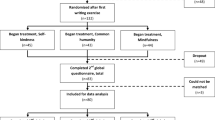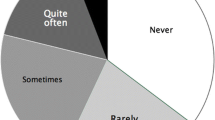Abstract
Studies show that religious people tend to be more grateful, yet existing research tends to rely on small, non-representative samples and limited measures of religiosity. Therefore, we use a national sample (the National Study of Youth and Religion) and multiple measures of religiosity to examine the extent to which religion is associated with feelings of gratitude. We find that religious efficacy and having religious friends positively predict the extent to which young adults feel grateful. In contrast, religious affiliation, participation in organized religion, private devotion, religious salience, otherworldly beliefs, and being spiritual but not religious are unrelated to experiencing feelings of gratitude.
Similar content being viewed by others
References
Adler, M. G., & Fagley, N. S. (2005). Appreciation: Individual differences in finding value and meaning as a unique predictor of subjective well-being. Journal of Personality, 73, 79–114.
Bartkowski, J. P., Xiaohe, X., & Fondren, K. M. (2011). Faith, family, and teen dating: Examining the effects of personal and household religiosity on adolescent romantic relationships. Review of Religious Research, 52, 248–265.
Becker, J. A., & Smenner, P. C. (1986). The spontaneous use of thank you by preschoolers as a function of sex, socioeconomic status, and listener status. Language in Society, 15, 537–546.
Burdette, A., & Hill, T. D. (2009). Religious involvement and transitions into adolescent sexual activities. Sociology of Religion, 70, 28–48.
Cornwall, M., Albrecht, S. L., Cunningham, P. H., & Pitcher, B. L. (1986). The dimensions of religiosity: A conceptual model with an empirical test. Review of Religious Research, 27, 226–244.
Emmons, R. A. (2004). The psychology of gratitude: An introduction. In R. A. Emmons & M. E. McCullough (Eds.), The psychology of gratitude (pp. 3–16). New York: Oxford University Press.
Emmons, R. A. (2005). Giving thanks: Spiritual and religious correlates of gratitude. Journal of Psychology and Christianity, 24, 140–148.
Emmons, R. A., & Crumpler, C. A. (2000). Gratitude as a human strength: Appraising the evidence. Journal of Social and Clinical Psychology, 19, 56–69.
Emmons, R. A., & McCullough, M. E. (2003). Counting blessings versus burdens: An experimental investigation of gratitude and subjective well-being in daily life. Journal of Personality and Social Psychology, 84, 377–389.
Froh, J. J., Emmons, R. A., Card, N. A., Giacomo, B., & Wilson, J. A. (2011). Gratitude and the reduced costs of materialism in adolescents. Journal of Happiness Studies, 12, 289–302.
Froh, J. J., Sefick, W. J., & Emmons, R. A. (2008). Counting blessings in early adolescents: An experimental study of gratitude and subjective well-being. Journal of School Psychology, 46, 213–233.
Froh, J. J., Yukewicz, C., & Kashdan, T. B. (2009). Gratitude and subjective well-being in early adolescence: Examining gender differences. Journal of Adolescence, 32, 633–650.
Glock, C. Y., & Stark, R. (1965). Religion and society in tension. Chicago: Rand McNally.
Gordon, A., Musher-Eizenman, D. R., Holub, S. C., & Darymple, J. (2004). What are children thankful for? An archival analysis of gratitude before and after the attacks of September 11. Journal of Applied Developmental Psychology, 25, 541–553.
Hill, J. P. (2011). Faith and understanding: Specifying the impact of higher education on religious belief. Journal for the Scientific Study of Religion, 50, 533–551.
Krause, N. (2006). Gratitude toward God, stress, and health in late life. Research on Aging, 28, 163–183.
Krause, N. (2009). Religious involvement, gratitude, and change in depressive symptoms over time. The International Journal for the Psychology of Religion, 19, 155–172.
Krause, N., & Ellison, C. G. (2009). Social environment of the church and feelings of gratitude toward God. Psychology of Religion and Spirituality, 1, 191–205.
Krause, N., & Hayward, R. D. (2014). Church-based social support, functional disability, and change in personal control over time. Journal of Religion and Health, 53, 267–278.
Krause, N., Hayward, R. D., Bruce, D., & Woolever, C. (2014). Gratitude to God, self-rated health, and depressive symptoms. Journal for the Scientific Study of Religion, 53, 341–355.
Lambert, N. M., Fincham, F. D., Braithwaite, S. R., Graham, S. M., & Beach, S. R. H. (2009). Can prayer increase gratitude? Psychology of Religion and Spirituality, 1, 139–149.
Manning, L. (2012). Spirituality as a lived experience: Exploring the essence of spirituality for women in late life. International Journal of Aging and Human Development, 75, 95–113.
McCullough, M. E., Emmons, R. A., & Tsang, J. (2002). The grateful disposition: A conceptual and empirical topography. Journal of Personality and Social Psychology, 82, 112–127.
McCullough, M. E., Tsang, J. A., & Emmons, R. A. (2004). Gratitude in intermediate affective terrain: Links of grateful moods to individual differences and daily emotional experience. Journal of Personality and Social Psychology, 86, 295–309.
Merriam-Webster. (2013). Retrieved November 15, 2013 from, http://www.merriam-webster.com.
National Study of Youth and Religion. (2008). Methodological design and procedures for the National Study of Youth and Religion (NSYR) longitudinal telephone survey (Waves 1, 2, and 3). Chapel Hill, NC: National Study of Youth and Religion. Retrieved November 20, 2013 from, http://www.youthandreligion.org/sites/youthandreligion.org/files/imported/research/docs/master_just_methods_11_12_2008.pdf.
Qu’ran. (2013). Retrieved October 12, 2013 from, http://www.islamawakened.com/quran/14/7/.
Rosmarin, D. H., Pirutinsky, S., Cohen, A. B., Galler, Y., & Krumrei, E. J. (2011). Grateful to God or just plain grateful? A comparison of religious and general gratitude. Journal of Positive Psychology, 6, 389–396.
Sandage, S. J., Hill, P. C., & Vaubel, D. C. (2011). Generativity, relational spirituality, gratitude, and mental health: Relationships and pathways. International Journal for the Psychology of Religion, 21, 1–16.
Toussaint, L., & Friedman, P. (2009). Forgiveness, gratitude, and well-being: The mediating role of affect and beliefs. Journal of Happiness Studies, 10, 635–654.
Tsang, J. (2006). Gratitude and prosocial behavior: An experimental test of gratitude. Cognition and Emotion, 20, 138–148.
Tsang, J. (2007). Gratitude for small and large favors: A behavioral test. Journal of Positive Psychology, 2, 157–167.
Tsang, J., Schulwitz, A., & Carlisle, R. D. (2011). An experimental test of the relationship between religion and gratitude. Psychology of Religion and Spirituality, 4, 40–55.
Vaidyanathan, B. (2011). Religious resources or differential returns? Early religious socialization and declining attendance in emerging adulthood. Journal for the Scientific Study of Religion, 50, 366–387.
Ventimiglia, J. C. (1982). Sex roles and chivalry: Some conditions of gratitude to altruism. Sex Roles, 8, 1107–1122.
Watkins, P. C., Woodward, K., Stone, T., & Kolts, R. L. (2003). Gratitude and happiness: Development of a measure of gratitude and relationships with subjective well-being. Social Behavior and Personality, 31, 431–451.
Wein, B. (2013). Saying thank you. Retrieved August 2, 2013 from, http://www.rabbiwein.com/blog/saying-thank-you-511.html.
Wink, P., Dillon, M., & Fay, K. (2005). Spiritual seeking, narcissism, and psychotherapy: How are they related? Journal for the Scientific Study of Religion, 44, 143–158.
Wood, A. M., Maltby, J., Gillett, R., Linley, P. A., & Joseph, S. (2008). The role of gratitude in the development of social support, stress, and depression: Two longitudinal studies. Journal of Research in Personality, 42, 854–871.
Wuthnow, R. (1998). After heaven: Spirituality in America since the 1950s. Berkeley: University of California Press.
Zinnbauer, B. J., & Pargament, K. L. (2005). Religiousness and spirituality. In R. F. Paloutzian & C. L. Park (Eds.), The handbook of the psychology of religion and spirituality (pp. 21–42). New York: The Guilford Press.
Acknowledgments
The National Study of Youth and Religion, http://www.youthandreligion.org, whose data were used by permission here, was generously funded by Lilly Endowment Inc., under the direction of Christian Smith, of the Department of Sociology at the University of Notre Dame.
Author information
Authors and Affiliations
Corresponding author
Rights and permissions
About this article
Cite this article
Kraus, R., Desmond, S.A. & Palmer, Z.D. Being Thankful: Examining the Relationship Between Young Adult Religiosity and Gratitude. J Relig Health 54, 1331–1344 (2015). https://doi.org/10.1007/s10943-014-9923-2
Published:
Issue Date:
DOI: https://doi.org/10.1007/s10943-014-9923-2




